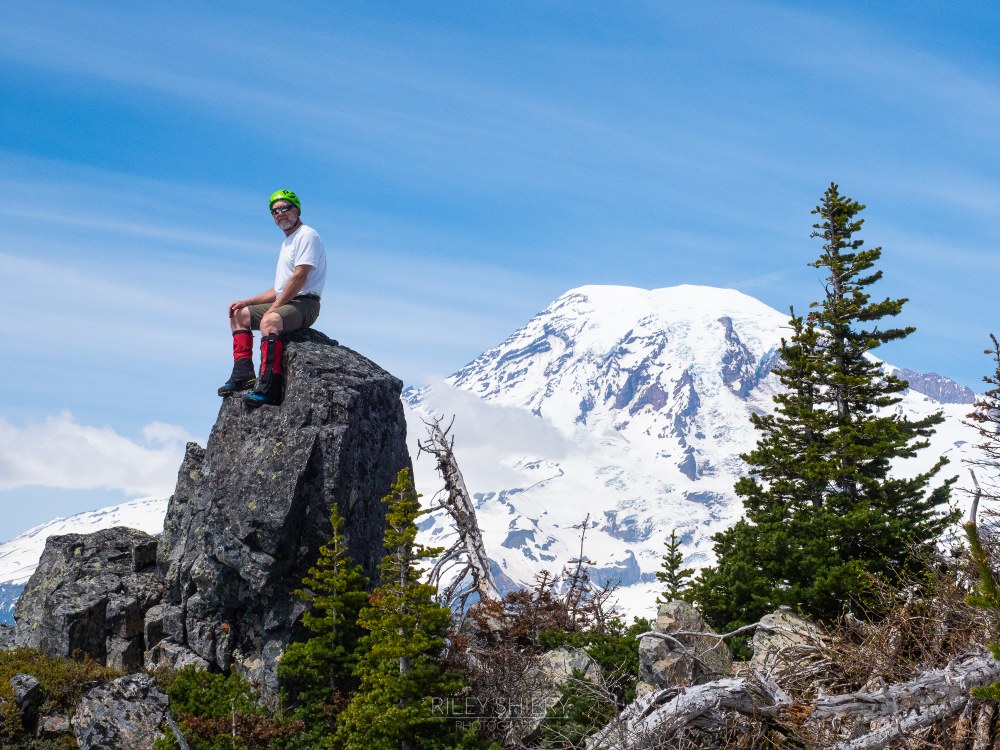
Known as the “widow maker” heart attack, a blockage in the left anterior descending artery (LAD) is almost always fatal. Symptoms include shortness of breath, left shoulder and arm pain, nausea, cold sweats, and the debilitating sensation of an elephant sitting on your chest. Had these signs appeared a few hours earlier while Tom Eckhout was skiing on Mount Rainier, the outcome might have been very different.
Thankfully, Tom was at home resting on the couch when his shoulder and arm pain, which had been present all day, began to progress. He checked his blood pressure and it was elevated. “I returned to the living room and tried to get comfortable. As the chest pain increased, I made my wife aware of my concerns, and she came in to take a look. By now I had the infamous elephant on my chest and she called 911.” Soon, Tom was hooked up to an EKG and rushed to the hospital where he underwent emergency surgery to put a stent in his LAD artery.
“Had I collapsed on Mount Rainier, I might not be talking to you today.”
Choosing family
Tom grew up in Michigan, where he fell in love with outdoor adventure and recreation. “As soon as I was old enough to start making my own decisions, I was out sleeping under the stars next to the campfire.” He studied electronics at the Ohio Institute of Technology and, after working for a few years in the area, Tom was given the choice between a job in Seattle or San Francisco. “I opted for Seattle just because I didn't know anything about it.”
Tom joined The Mountaineers the year after he arrived, 1981. He promptly took our Winter Travel, Basic Scrambling, and Basic Climbing courses, and in short order became a trip leader. Today Tom’s volunteer profile with The Mountaineers reads like the lines of a phone book, consistent and seemingly endless. His contributions to the Olympia Branch and the organization as a whole are innumerable, noted by his being awarded the Super Volunteer and Key Leader badges every year since their creation. Tom also received the coveted Olympia Branch Service Award in 2017, given to one individual a year for going above and beyond the call of duty.
In truth, Tom is a self-proclaimed serial volunteer, always donating his time to one organization or another. Outdoors for All, Boy Scouts of America, and The Mountaineers are just a few of the organizations he’s worked with. He’s been offering his time his entire life, starting with filling sandbags to help with rising water levels at Lake St. Clair in Michigan when he was young, and raising money in high school for those with muscular dystrophy. As a father he worked with the Boy Scouts during his son’s time with their troop. Volunteerism is in his blood, so much so that his wife Linelle nicknamed him her “professional volunteer.”
When Tom and Linelle welcomed a son, Jarrod, in 1985, Tom took a step back from the mountains. “At that time I enjoyed the climbing and I really was exhilarated by it. But when I would get home and reflect, I started realizing that I was kind of hanging out there,” he said. “I have a family to feed. That's when I backed off of technical climbing and became a scrambler.”
As a young family of three, the Eckhouts would head into the outdoors with their hard-top camper, and together they spent the next few years exploring the Cascades and eastern Washington. “During Jarrod’s early years, we did a lot of car camping. My wife wasn’t really into the backcountry stuff, so I bought the hard-top camper. I started backpacking with Jarrod when he was six or seven years old.”
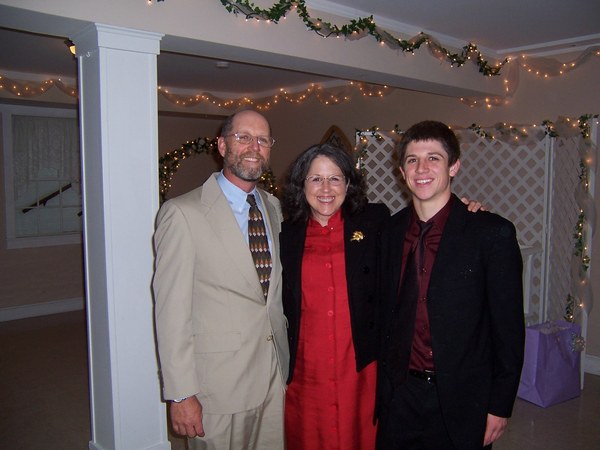 Tom, Linelle, and Jarrod. Photo courtesy of the Eckhout Family.
Tom, Linelle, and Jarrod. Photo courtesy of the Eckhout Family.
Even when Tom largely stepped away from his responsibilities leading trips and courses within The Mountaineers, he came back to teach Mountaineering Oriented First Aid (MOFA) every year, one of his favorite programs.
The Eckhout family moved to Olympia in 2006, partially as a result of the dot-com bubble burst, which forced Tom into a different line of work. He pursued carpentry as a handyman, skills he had always enjoyed. Around the same time, Tom also returned to The Mountaineers, where he found the Olympia Branch’s size and nature suited him. Today he calls the Olympia Mountaineers family.
Facing mortality
Lessons of acceptance seem to follow when you face your own mortality, and Tom, unfortunately, has had to learn to accept more than his fair share of hardships. In 2001 he was diagnosed with chronic lymphocytic leukemia, a form of leukemia that often isn’t treated until it starts to cause problems for the patient. This may take years, or even decades. It’s monitored through markers of certain enzymes in the blood. If those markers present positive, then everything is alright, like in Tom’s situation. The caveat is that at any time, those markers can morph into something negative.
When he was first diagnosed, Tom struggled with the idea of the disease’s chronic nature. “I've been told I have this disease, but with most cancers you can go in and cut it out. When you've got leukemia, and it's a chronic type of leukemia, it's coming from your bone marrow. There's nothing they can do to stop it. You just watch and monitor. There is no way to get past it.”
When he was first diagnosed, Tom struggled with the idea of the disease’s chronic nature. “I've been told I have this disease, but with most cancers you can go in and cut it out. When you've got leukemia, and it's a chronic type of leukemia, it's coming from your bone marrow. There's nothing they can do to stop it. You just watch and monitor. There is no way to get past it.”
One concept that helped him cope with the ambiguous diagnosis was an idea he learned in his early days at The Mountaineers: PMA. It stands for Positive Mental Attitude, and it’s something he learned on scrambling trips and kept as his own mantra. To regain his PMA after the leukemia diagnosis, Tom leaned on the advice of one of his doctors, who helped put it in perspective: “She said, ‘you know Tom, every one of us is a ticking time bomb. The only difference between you and the next guy is that you know your fuse has been lit.’ It was simple wisdom, but it helped me get my head around it.”
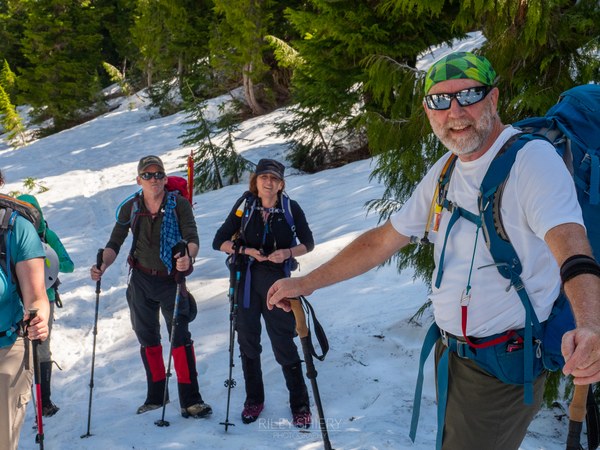 Darren Boyd, Amy Wilson, and Tom on their way to the summit of Foss Peak. Photo by Riley Shiery.
Darren Boyd, Amy Wilson, and Tom on their way to the summit of Foss Peak. Photo by Riley Shiery.
Tom eventually found the Leukemia Lymphoma Society, a group working to fund more research into those diseases, and started volunteering with their Hike for Discovery program. He worked on weekend hikes to raise money for research, with a secondary goal of raising money for trips to scenic areas for the participants. The community and the purpose of the program helped Tom come to terms with the disease. He volunteered as a hiker his first year, but spent the next couple years coaching participants.
Throughout this time, Tom and his son Jarrod continued to go on trips together, but as Jarrod grew into his teenage years he became a proficient sport climber separate from dear old dad. “By then, he was doing things with his friends instead of wanting to do stuff with me, so we didn’t get back into mountaineering [together]”, Tom said. “We’d go on the occasional hike or backpack though.”
In 2007, Jarrod passed away at the age of 22. It brought a startling halt to Tom and Linelle’s lives. “I was lost when that happened,” said Tom, the weakness in his voice revealing the depth of the pain that comes with losing a child. “We only had one child and he was gone. When he passed, we were looking for our own meaning of life again.”
Grief and healing
Everyone grieves differently, and Tom went back to doing what was comfortable: volunteering his time. After Jarrod’s passing, Tom dove back into volunteering with The Mountaineers, seeking an outlet for his grief and a road to recovery. “It was a way for me to focus. It became a very big part of my grieving process and helping me through it.” He started working with most of the Olympia branch committees, including scrambling, Nordic & backcountry skiing, navigation, first aid, winter travel, snowshoeing, and climbing.
“I think it saved me,” he said in earnest, with a tear in his eye.
Three seasons ago, Tom had a breakthrough. “I like to talk. So when I was leading students out on a scramble or on a field trip, I often brought up what I called ‘Jarrod stories.’ I had a group of students and I'm leading them, many of them on the very first mountain peak they've ever achieved, as far as a climb. And I was telling a Jarrod story as we were approaching the summit. Most of these stories are anecdotal and they're comical. And this particular one was emotional. I'm telling the story and I'm tearing up, crying as we get to the summit. I look around and almost everybody is crying with me. It wound up being good and everybody had a good time, but after that trip, I started thinking about it and I felt a little guilty for utilizing them as my crutch.”
Stepping back, Tom realized that he could be impacting the students on their trips. Concerned about his effect on them, he interviewed a few of his participants and came to understand that maybe he didn’t need to share so much. “It helped me realize that I am moving through this grieving process and I am progressing. The fact that I can think about it from a different perspective rather than just my own… I thought that was important.”
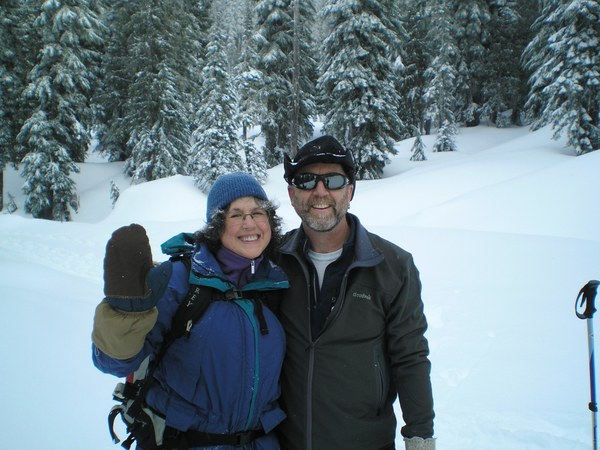 Linelle and Tom near Narada Falls in Mount Rainier National Park. Photo courtesy of the Eckhout Family.
Linelle and Tom near Narada Falls in Mount Rainier National Park. Photo courtesy of the Eckhout Family.
A resilient spirit
Eleven years after his son’s passing, Tom faced mortality again on November 24, 2018, this time his own. The heart attack shook loose thoughts from his cancer diagnosis and from his son’s passing.
“It has really made me again appreciate everything, I mean, you have a near death experience and it changes your thinking a bit. In my case I’ve been dealing with my own mortality for quite a while.”
Luckily, the blockage wasn’t severe and recovery was remarkably light. “Two days after the procedure there was no physical evidence that I’d had a heart attack,” he said. Less than three weeks later, Tom was scuba diving in Mexico (though not too deep, per the doctor’s orders).
Tom said he’s learned to appreciate the fragility of life in more ways than one, and that having the understanding of what we have to lose and how that makes you extra appreciative for what you have now, has become a big part of who he is.
Tom’s positive outlook is as remarkable as the amount of time he’s donated throughout his life. Any one of these three life-defining experiences with death would be enough to rattle someone’s worldview and leave them worse for it. Tom’s continued optimism is inspiring, and his willingness to help others is no different. “All of my life experiences have kind of added up into understanding that life is very fragile. You really have to appreciate every minute that you’ve got and just go for it.”
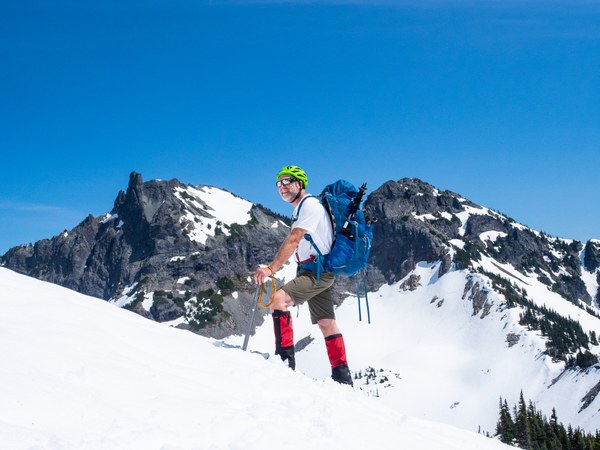 Tom Eckhout, Olympia Service Award Winner, Super Volunteer, and Key Leader.
Tom Eckhout, Olympia Service Award Winner, Super Volunteer, and Key Leader.
This article originally appeared in our Fall 2019 issue of Mountaineer Magazine. To view the original article in magazine form and read more stories from our publication, click here.
Add a comment
Log in to add comments.Tom is one of the main reasons that I am a Mountaineer!!! Cheers, Tom!!!
 Trevor Dickie
Trevor Dickie